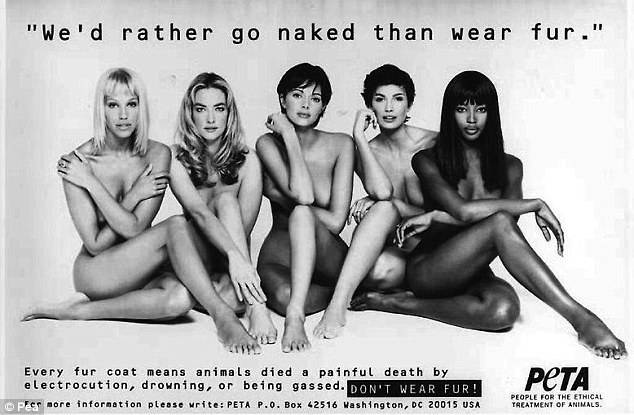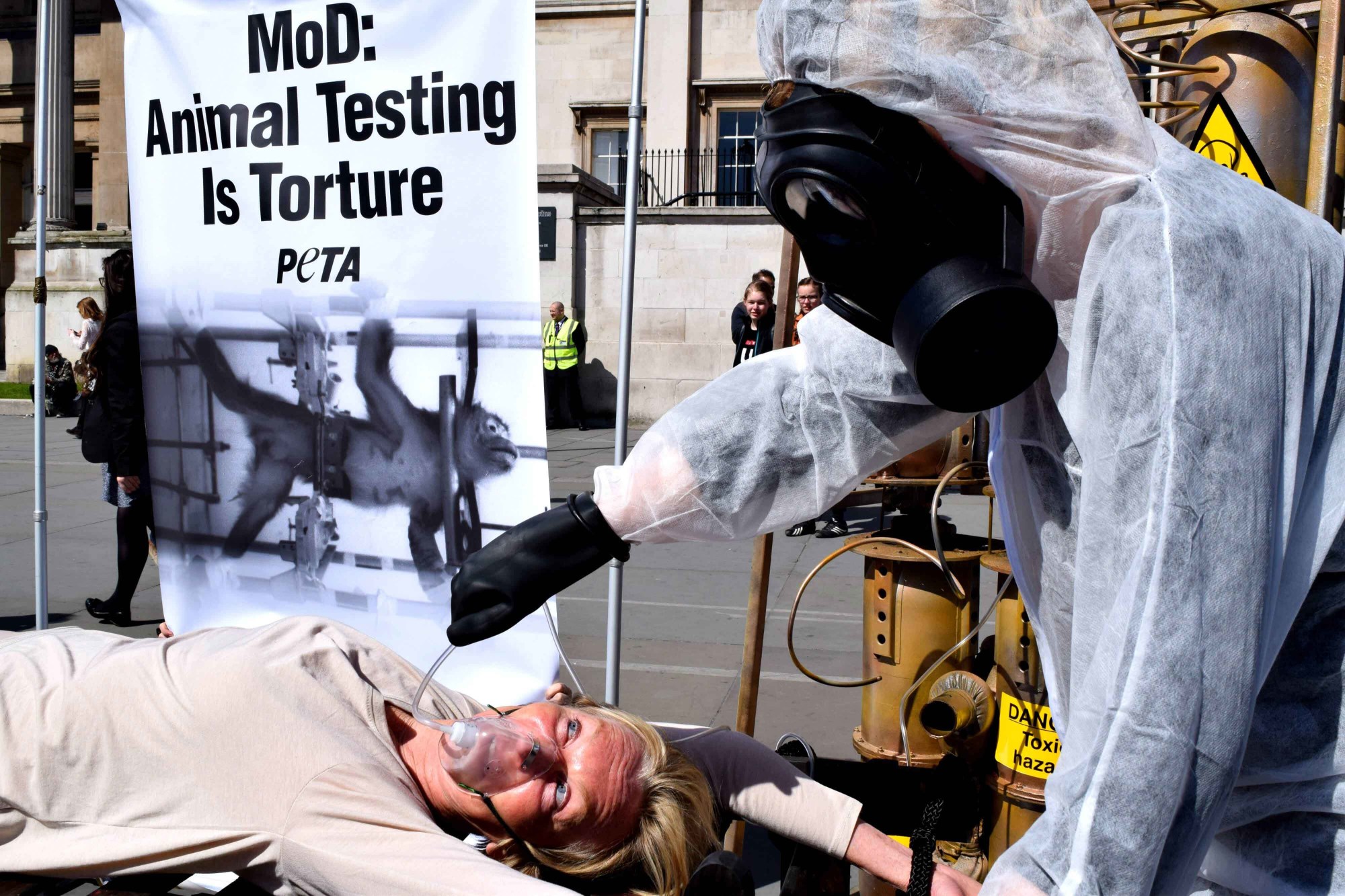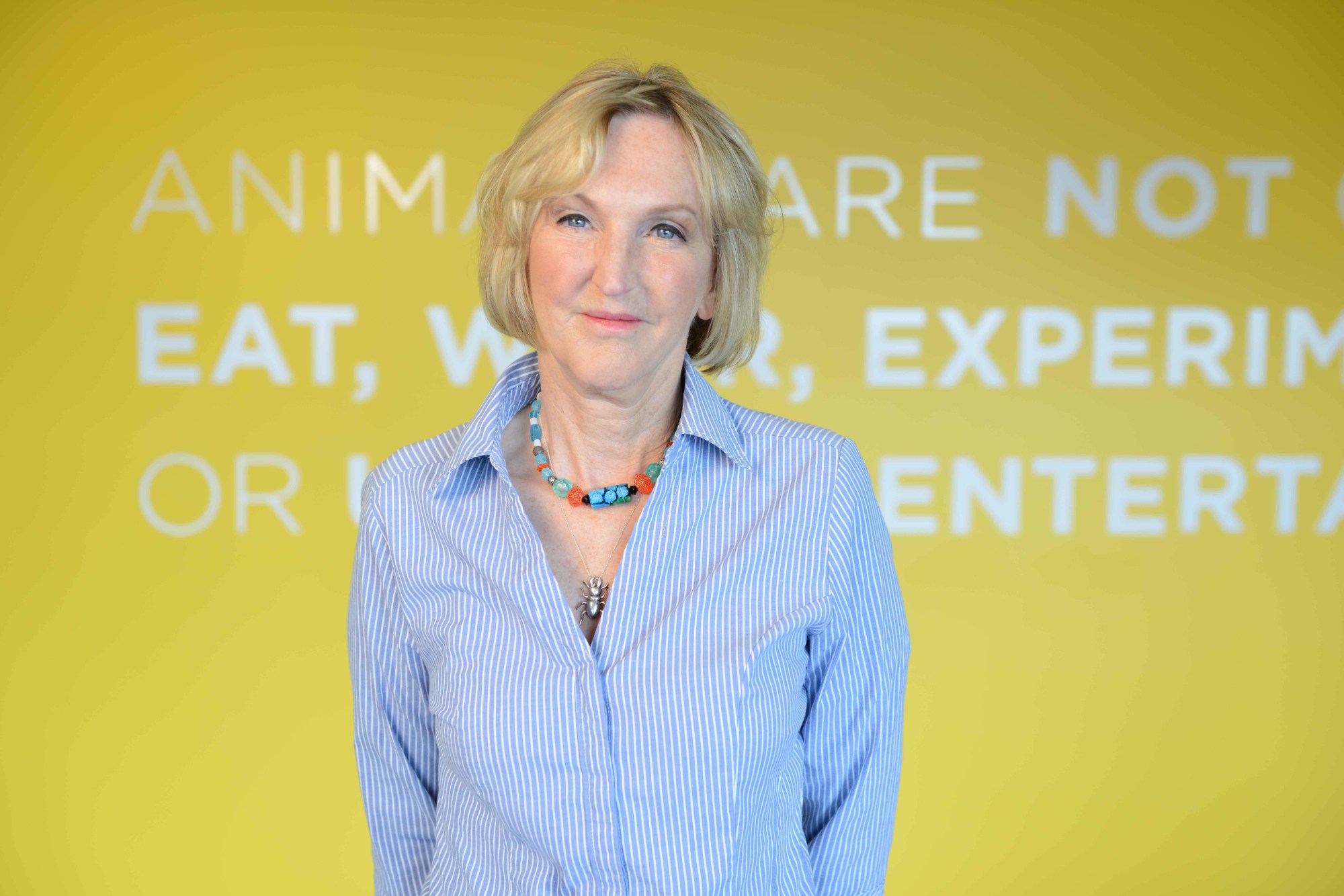Ingrid Newkirk is explaining to me the thinking behind the large torture device currently sitting in her office. Born in England, raised in India, and now residing in the US, the PETA founder’s polite, Mid-Atlantic accent has a tendency to belie the often shocking nature of her activism, one that will see her strapped to said prop in protest of the Ministry of Defense’s tests on animals later that day. She’s so casual about it, in fact, she may as well be discussing the vegan macarons her assistant has brought for us (a present from a vegan baker in Stoke Newington).
Of course, this isn’t casual for Newkirk at all. Since co-founding People for the Ethical Treatment of Animals along with Alex Pacheco in 1980, the campaigner has dedicated her entire life to issues of animal rights — from promoting vegan lifestyles and fighting to end animal testing, to her work in raising awareness of the fur trade within fashion, most notably through the iconic “I’d Rather Go Naked Than Wear Fur” campaign, beginning in the early 1990s with supermodels Emma Sjoberg, Tatjana Patitz, Heather Stewart Whyte, Fabienne Terwinghe and Naomi Campbell. Often controversial, always thought-provoking, Newkirk visited the UK last week for a new talk, Unstoppable, which aims to enhance our perspective on our relationships with other animals. We met in PETA’s bright and airy London office to discuss what drives her, as well what she believes to be the biggest issue facing fashion today.

You began animal protection work at twenty years old. You’re sixty-six now. You’ve dedicated more than two-thirds of your life to this cause. How have your objectives changed?
When I started, it was very much about just being as kind as you could within the context of using animals. I never questioned that you ate them or that you wore them, but I thought that you shouldn’t be sadistic or miserable to them. You should be considerate. I always say I’m a slow learner, and so it evolved a bit — from just protect them in the context of using them to [asking] “why the hell are we using them at all?”
To reach a point where more and more people are thinking “what the hell are we all doing?” is it necessary to approach things in that gradual way?
We always say we try to keep our “feet on the ground and our head in the clouds.” We want to get from A-Z, so we move from A-B, B-C. But we’re very forthright in saying animals are not ours. They don’t belong to us. So let’s just respect them. And in the meantime if you can’t come to terms with that, then at least don’t sear the cows horns out of its head with a hot iron, at least decide you don’t need a real fox around your neck when you go out in winter, at least, at least, at least. And in the end, why the hell do you need to use any of them? Because we know so much! People are now growing up with the internet. We used to have to go to the library and look things up! There were excuses back then. Now there really are no excuses not to know what makes animals tick and how similar they are to us.
What about yourself, pre-internet? What was the moment you became really switched onto the suffering of animals?
Oh, well for me it was childhood. I grew up with a dog. I didn’t have brothers and sisters. So the dog and I hung out and tried to avoid the parents as much as possible. We played together. We were brother and sister. And of course, growing up like that, you see the expression on the other individual’s face. He would notice about me and I would notice about him and we looked after each other. So that was an awakening to me, that I tend to be able to read animals’ faces. I look at their eyes and I notice subtle things.

But presumably at this young age you didn‘t realize that you would dedicate your life to animal welfare?
No. I was in India. We lived there from when I was eight till when I was sixteen and during that time I saw a lot of cruelty, openly on the street. Which, of course, you don’t see in England or the U.S. It’s all hidden away and sanitized and we’re not allowed to know about it. But it was there, in front of you, and it broke my heart. I’m sensitive to animals. Empathetic. I don’t understand art, some people do, I understand animals. When we left and came back to England, I said, “When I grow up, I’m going to come back and set up an animal protection organization.” And then I got lost because either were all sorts of exciting things happening in England and I was a teenager! But now it’s happened. For 15 years we’ve had PETA India.
Thinking back to then, when you returned to England, that concept of animal rights was nearly non-existent, wasn’t it?
Yeah. It’s funny because England has always been thought of as a nation of animal lovers. But that was like my father and mother. They would be outraged if someone kicked a dog or starved a horse. They’d be outraged! But we ate them, we wore them. One of my favorite hats was from a wild cat in Cashmere and I loved that hat. It just didn’t occur to me. Nobody was there — the way that animal rights is there today — to connect the dots. There was no awareness. And now you can’t miss it. Unless you’ve lived in a cave and not had access to the internet, you can’t say you’re ignorant anymore.
What‘s the most pressing issue facing fashion today?
It’s a country. China. Everything imaginable is coming in from China. There isn’t one animal protection law. Not one. And of course we’ve been to the markets and we’ve video taped foxes, racoon dog, Angora farms… we’ve been to so many of them in China. I really respect Inditex, which owns Zara and all these other companies, because we were able to show them what we’d found with Angora rabbits, the live plucking of the rabbits. They’re tied down and then people just come along and pull out their hair. And they scream. Now these are pray animals, pray animals try not to scream. They have to be in wretched pain because that will attract other predators, so they’re mute. And Inditex, to its absolute credit, agreed to our demand to go with their monitoring and auditing team to China. When we showed them them that their farms were every bit as wretched and cruel as all the rest of the places, they not only stopped selling it and made a commitment to not sell it again, they took the the million pounds worth of Angora on their shelves and sent it to Syrian and Iranian refugee children. That’s an ethical company!
Why are certain initiatives picked up more quickly than others? Does the “cute factor” come into play it at all?
Yes. It shouldn’t be this way. It really is all horrid in the scheme of things. But I do believe if the geese, which are live plucked, could scream the way the rabbits could scream… Most people don’t eat rabbits. And I believe that it’s easier, if you will, for people to relate to animals they find attractive and people do like bunnies. And then the screaming, I think, is something that really got to people. If geese could scream, if sheep could scream. Sheep, bless their hearts, they’re just the dearest of animals. They’re such family animals too. So if only sheep screamed the way the Angora rabbits scream, it would be good day for sheep I think.

What simple and effective things can consumers do to help?
If they see anything that comes from an animal, leave it on the wrack, leave it on the shelf. Avoid it like the plague. Don’t spend your money on it. You’re not bludgeoning, you’re not causing this pain, but it goes into the pocket of someone who will cause pain to animals. And if you wouldn’t do it to your dog then please, please don’t pay anybody to do it to somebody you can’t see. Some individual who really wishes you’d wear something else.
What would be your message to young designers, particularly those who may be approached by big fur companies?
Be ethical. Depend on your creativity. There’s nothing creative about slaughter and stealing. It’s something from your great-great-grandfather’s time. You’re either creative or you’re not. Don’t sell out, don’t sell out, don’t sell out. It’s an ages old message that everyone has heard and it’s true today. Just don’t sell out, please don’t sell out.
Where does your resilience come from? Just thinking of the things you‘ve seen… are you not exhausted?
Well, let’s see. I cry a lot. I do. But, honest to God, I feel that I’m very lucky because, what if I didn’t have a voice for this? What if I didn’t have a forum? I have this opportunity to try my best and get people to make a difference and that’s encouraging to me. That’s what I have to do everyday. Otherwise I’d just curl up in a corner and be miserable. And I can’t afford to do that.
You won‘t ever stop either, will you?
I’m not allowed to stop! You don’t want to be leaving life thinking, he who has the most toys wins. What garbage. You have to leave life thinking “I tried” or “I did that”. Whatever calls to you. Whether it’s cleaning up streams, hopefully it’s a cause. But whatever you do, you should try. Otherwise what’s the point?
Credits
Text Matthew Whitehouse
Images courtesy of PETA
